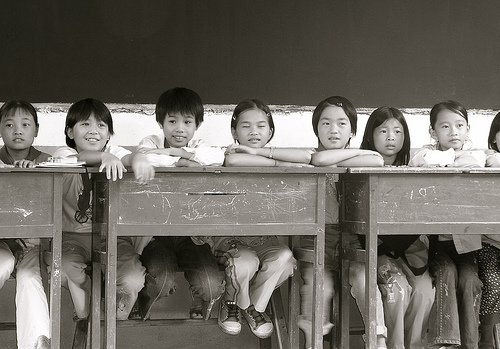Engagement in the middle years of school may well be an oxymoron.
This was recently confirmed for me when starting off a year 9 class of boys in their research for an effective speaking competition. We gave them a brief: talk about an event which has had a significant impact on society or has stood out in history.
Hmmm…. reading long chunks of text wasn’t something they were going to do willingly, especially during the last period of the day. What about videos? Yes, miraculously focus was rediscovered, and the boys managed to maintain their concentration for almost an hour as they browsed the list of videos I’d prepared.
Fact known by all: young people respond well to information presented in video format.
That’s why TED is such a great teaching tool. I forget about it sometimes, but really, there’s so much information to spark thinking, discussion and debate.
Today the TED blog recommended the childish thinking playlist.
Today’s playlist is about kids and their brains, which hold the dreams and possibilities of our future. How can we teach them … and how can we learn from them?
TED recommends, amongst other videos, Adora Svitak, who makes the case that grownups have lots to learn from “childish” thinking — creativity, audacity, open-mindedness.
[ted id=815]
Here’s another one:
Who are the leaders of tomorrow? Joachim de Posada shows how to find them — with a marshmallow
[ted id=553]
Dave Eggers thinks like a child to create a massively popular after-school tutoring club — starring pirates, superheroes, time travel …
[ted id=233]
Then you’re invited to share your favorite stories about kids in the TEDTalks archive –
Add your suggestions for this playlist to the comments below, or email contact@ted.com with the subject PLAYLIST: KIDS. (Jog your memory with the TEDTalks spreadsheet.)
A brilliant way to share best TED content within a theme.
The spreadsheet is seriously informative, and lists the name of the TED talk, the speaker, a short summary, duration of video and publishing date. Very nice. I really like seeing, at a glance, the shorter videos because they are often just what I’m looking for to show students.
I found Sirena Huang, an 11 year old prodigy on violin, playing beautifully and talking about her instrument.
[ted id=45]
TED’s format is satisfying, providing biography and links, as well as transcript. Excellent for teaching purposes. It also provides relevant websites, you can bookmark the speaker on the site if you like, and you also get a list of related speakers and themes.
I think I should plan to use TED in teaching regularly.
Has anyone used TED talks in teaching? Would you like to share your experiences?


